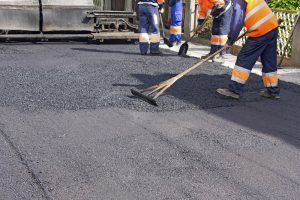Transform Your Pavement: Ingenious Asphalt Repair Techniques
Cold Mix Asphalt: Transforming the Means We Build Roadways
As the infrastructure industry continues to evolve, the application of cold mix asphalt provides a promising shift in roadway building and construction approaches. The cutting-edge buildings of chilly mix asphalt are challenging standard road-building methods, leading the means for enhanced performance and durability.
Benefits of Cold Mix Asphalt
What advantages does cool mix asphalt offer over conventional hot mix asphalt in road building tasks? Cold mix asphalt provides a number of benefits that make it a recommended option in certain circumstances. One crucial benefit is its capability to be used in all climate condition, unlike hot mix asphalt which calls for specific temperature conditions for blending and laying. This versatility enables year-round construction, reducing task timelines and expenses connected with weather delays.
Moreover, cool mix asphalt can be stockpiled for future usage, providing comfort and cost savings for maintenance tasks. Its ease of application, calling for no specialized devices or home heating, makes it excellent for fast fixings and patching. In addition, chilly mix asphalt is more eco-friendly as it calls for much less power for manufacturing and discharges lower levels of greenhouse gases compared to hot mix asphalt. These benefits incorporated make cool mix asphalt a reliable and flexible option for numerous road construction projects.

Ecological Advantages
One of the vital ecological advantages of cool mix asphalt is its lower carbon footprint compared to warm mix asphalt. Furthermore, cold mix asphalt is commonly made making use of recycled materials such as redeemed asphalt pavement (RAP) and recycled asphalt roof shingles (RAS), more decreasing the need for new raw materials and drawing away waste from garbage dumps.
Furthermore, making use of cold mix asphalt can result in lowered energy intake during construction because of its capacity to be used using typical tools without the need for extra home heating procedures. This not just reduces fuel usage yet additionally minimizes air pollution and enhances air top quality in the bordering areas. By selecting cold mix asphalt for road jobs, building firms can make a positive effect on the setting while still ensuring resilient and high-grade road surface areas.
Versatility in Climate Condition
In roadway building and construction tasks, the convenience of cool mix asphalt in different weather boosts its usefulness and performance. Unlike warm mix asphalt, which needs high temperature levels throughout mixing and setup, cold mix asphalt can be used in a vast array of climate conditions. Asphalt Repair. This versatility makes it an important choice for road construction in regions with severe temperature levels or uncertain weather patterns
Cold mix asphalt continues to be convenient even in cold climate, permitting building projects to proceed throughout winter season months when warm mix asphalt might not be a practical option. Its ability to cure and set without the requirement for heats ensures that roadway maintenance and repairs can be accomplished year-round, lessening disruptions to website traffic flow and look at this web-site reducing general project timelines.
In addition, chilly mix asphalt's resilience to wetness makes it suitable for locations prone to constant rain or high moisture. Its flexibility and resilience allow it to stand up to expansion and tightening brought on by temperature changes, adding to longer-lasting roads that call for fewer repair services gradually. In general, the adaptability of cold mix asphalt in various weather makes it a dependable choice for efficient and sustainable roadway building and construction jobs.

Cost-Effectiveness and Sustainability
Taking into consideration the ecological and economic effects of road building and construction materials, just how does the cost-effectiveness and sustainability of cool mix asphalt contrast to standard options? In terms of cost-effectiveness, cold mix asphalt usually requires lower manufacturing temperature levels, minimizing energy usage and production costs contrasted to warm mix asphalt.
The capacity to recycle existing products right into chilly mix asphalt contributes to a circular economic climate strategy, decreasing the demand for virgin materials and learn this here now lowering general ecological impact. In general, the cost-effectiveness and sustainability of cool mix asphalt make it a promising option to conventional road construction materials.
Influence On Roadway Resilience
Cold mix asphalt, with its unique features, has a notable influence on roadway resilience. One vital aspect is the capability of cold mix asphalt to stand up to temperature changes without endangering its structural stability.
Moreover, the chilly mix asphalt's improved resistance to moisture damages plays an essential role in maintaining roadway resilience. Conventional warm mix asphalt is extra prone to dampness seepage, which can damage the sidewalk structure in time. In contrast, chilly mix asphalt's structure allows it to better stand up to water penetration, minimizing the possibility of craters and other kinds of degeneration.
Final Thought
Finally, chilly mix asphalt uses a multitude of advantages for road construction, including environmental advantages, flexibility in climate condition, cost-effectiveness, and enhanced road durability. Its capacity to be used year-round and its lasting methods make it a transformative alternative for producing roads that are content both environmentally friendly and sturdy. With its ingenious strategy and durable results, cold mix asphalt is transforming the way we construct roads for an extra sustainable future.
What benefits does cold mix asphalt deal over standard warm mix asphalt in road building projects? Additionally, cold mix asphalt is extra ecologically pleasant as it requires much less power for production and releases lower levels of greenhouse gases compared to warm mix asphalt. Asphalt Repair. In addition, cold mix asphalt is often made using recycled materials such as recovered asphalt sidewalk (RAP) and recycled asphalt roof shingles (RAS), additional decreasing the demand for new raw products and drawing away waste from landfills
Unlike warm mix asphalt, which requires high temperature levels throughout blending and installation, cold mix asphalt can be used in a large array of weather condition conditions. In terms of cost-effectiveness, cold mix asphalt generally needs lower manufacturing temperatures, lowering energy usage and manufacturing prices compared to hot mix asphalt.